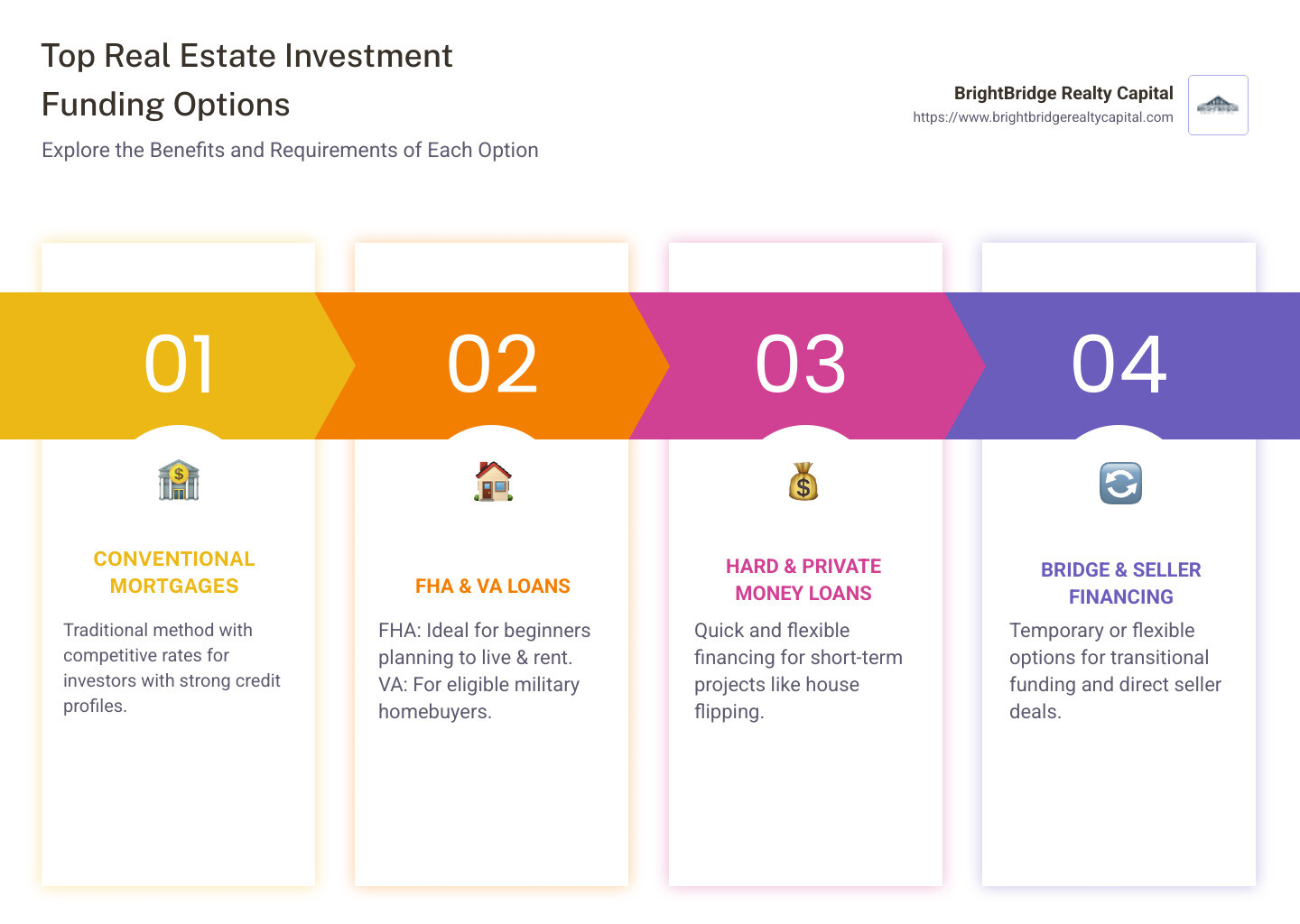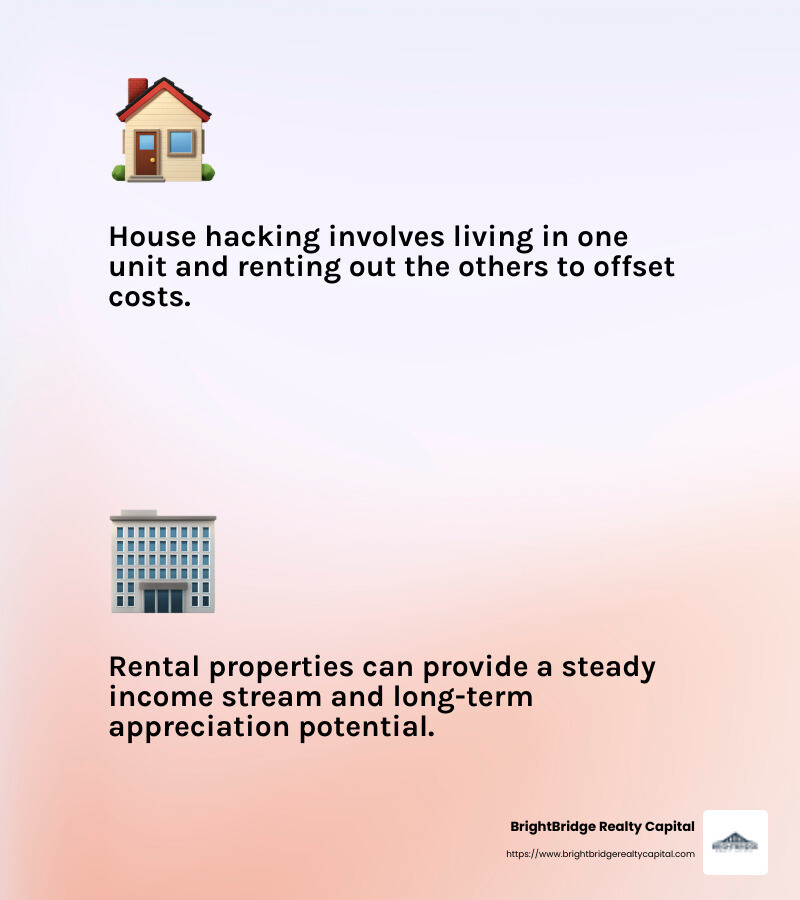Real Estate Investment Funding: How to Get Started

Real estate investment funding is crucial for those eager to dive into property acquisition but unsure where to start with financing options. Whether you're an experienced investor aiming to expand a rental portfolio or a newcomer seeking to flip properties swiftly, understanding your funding choices can be a game-changer.
To quickly grasp real estate investment funding options, consider these routes:
- Conventional Mortgages: Traditional method with great rates for investors with strong credit.
- FHA Loans: Ideal for new investors intending to live and rent on-site.
- VA Loans: Perfect for eligible military buyers who plan to live on the property.
- Hard Money Loans: Quick financing with short-term payoff, suited for flipping projects.
- Private Money Loans: Flexible terms through private lenders.
- Bridge Loans: Temporary funding to transition between investments.
- Seller Financing: Direct financing from sellers with potential flexibility.
- Customized Solutions: Custom financing to meet unique investment needs.
Each option comes with its own benefits and requirements, and choosing the right one can be the key to a successful investment.
Real estate is not just about buying and selling properties—it's about making strategic funding decisions to leverage opportunities effectively.

Understanding Real Estate Investment Funding
Real estate investment funding can feel overwhelming at first, but understanding the basics can help you make smart decisions. Let's break down the key components: investment property, financing options, and leverage debt.
Investment Property
Investment properties are real estate assets purchased to generate income through renting, leasing, or selling at a profit. They offer a variety of benefits:
Steady cash flow: By renting out properties, investors can earn consistent income. For example, properties in high-demand areas can provide a reliable revenue stream.
Property appreciation: Historically, real estate appreciates over time. Since 1963, U.S. home prices have increased by over 5.5% annually, outpacing inflation at 3.9% per year.
Tax benefits: Investors can deduct mortgage interest, property taxes, and depreciation, reducing taxable income. Strategies like 1031 exchanges can defer capital gains taxes.
Portfolio diversification: Real estate often behaves differently than stocks, providing a buffer during stock market downturns.
Financing Options
Choosing the right financing option is crucial. Here are some common methods:
Conventional Mortgages: These are the go-to for many investors with good credit. They require a higher down payment but offer competitive rates.
Hard Money Loans: These are short-term loans ideal for quick property flips. They have higher interest rates but provide fast access to funds.
Private Money Loans: Offered by private lenders, these loans are flexible but can strain personal relationships. They are based on trust and personal agreements.
Home Equity Loans and HELOCs: These leverage the equity in your existing home. While they offer lower rates, they risk foreclosure if payments aren't met.
Seller Financing: The seller acts as the lender, allowing buyers to pay directly to them. This can be flexible but involves risks like potential buyer default.
Leverage Debt
Leverage is a powerful tool in real estate investment. It allows you to control a high-value asset with a relatively small amount of your own money. The key is to use borrowed funds wisely to increase potential returns:
Control More with Less: By using loans, you can purchase more properties than if you relied solely on cash.
Build Equity: As tenants pay rent, they help pay down the mortgage, increasing your equity over time.
Risk Management: While leverage can amplify returns, it also increases risk. If property values drop, you could owe more than the property is worth.
Understanding these elements of real estate investment funding can set the stage for successful property investments. Next, we'll dig into the best financing options available for real estate investors.
10 Best Real Estate Investment Financing Options
When it comes to real estate investment funding, choosing the right financing option is key to maximizing your returns and minimizing risks. Here's a rundown of the ten best options:
1. Conventional Mortgages
Conventional mortgages are a popular choice for investors with a solid credit history. They typically require a 20% down payment and offer competitive interest rates. These loans are best for purchasing single-family homes or small multi-family units. You can secure these loans through banks or credit unions.
2. FHA Loans
FHA loans are great for new investors looking to start with a multi-family property. They allow for a lower down payment (as low as 3.5%) and have flexible credit requirements. However, you must live in one of the units as your primary residence. This makes FHA loans ideal for house hacking.
3. VA Loans
Reserved for military veterans and service members, VA loans offer 0% down payments and no private mortgage insurance. Like FHA loans, you need to live on the property. They're perfect for eligible military buyers looking to invest in a property they can reside in while renting out other units.
4. Hard Money Loans
Hard money loans are short-term loans provided by private lenders. They're based more on the property's value than the borrower's creditworthiness. These loans are ideal for quick fix-and-flip projects due to their fast approval process but come with higher interest rates.
5. Private Money Loans
Private money loans come from individuals or private companies willing to lend based on a personal relationship. They offer flexibility but can strain relationships if not managed well. These are best for investors who have access to wealthy acquaintances or family members willing to invest.
6. Bridge Loans
Bridge loans are temporary loans used to bridge the gap between buying a new property and selling an existing one. They have higher interest rates and shorter terms, making them suitable for investors needing quick access to funds for a new purchase while waiting for another property to sell.
7. Commercial Real Estate Loans
Commercial loans are used for financing multi-unit residential or commercial properties. They require higher credit scores and down payments. These loans are ideal for investors looking to purchase large apartment complexes or commercial spaces.
8. Home Equity Loans and HELOCs
These loans allow you to borrow against the equity in your home. Home equity loans provide a lump sum, while HELOCs offer a revolving line of credit. They're great for investors looking to fund additional property purchases but come with the risk of foreclosure if payments aren't made.
9. Seller Financing
In seller financing, the seller acts as the lender, allowing the buyer to make payments directly to them. This can be a flexible option for buyers who may not qualify for traditional loans. However, it carries risks, such as potential default by the buyer.
10. Customized Financing Solutions
For those looking for custom solutions, companies like BrightBridge Realty Capital offer customized financing options. These solutions are designed to align with your specific investment strategy and growth plans, providing the flexibility needed to expand your portfolio.
Choosing the right real estate investment funding option depends on your financial situation, investment goals, and risk tolerance. Next, we'll discuss key considerations to keep in mind when selecting your financing option.
Real Estate Investment Funding: Key Considerations
When diving into real estate investment funding, there are three critical factors to keep in mind: down payments, credit requirements, and interest rates. Understanding these can make or break your investment journey.
Down Payments
Most financing options for investment properties require a significant down payment. Conventional mortgages, for instance, typically demand at least 20% down. This is because lenders view investment properties as riskier than primary residences.
However, some options like FHA loans allow for lower down payments, as low as 3.5%, but come with the condition that you must live in one of the units. VA loans even offer 0% down payments for eligible veterans, providing a unique opportunity for those who've served in the military.
Credit Requirements
Your credit score plays a huge role in real estate financing. Higher scores open doors to better interest rates and loan terms. For conventional loans, you'll generally need a credit score of at least 620. But keep in mind, the higher your score, the more favorable your terms will be.
Hard money loans are an exception as they focus more on the property's value than your credit score. This makes them appealing for quick deals, but they come with higher interest rates.
Interest Rates
Interest rates can significantly impact your investment's profitability. These rates vary based on the loan type and your creditworthiness. Conventional loans usually offer competitive rates, but they can fluctuate based on market conditions.
Hard money loans, while offering quick access to funds, come with notably higher interest rates. This makes them suitable for short-term projects, like house flips, where you can repay quickly.
Balancing Your Options
Finding the right balance between down payments, credit requirements, and interest rates is key. It’s about aligning these factors with your financial situation and investment strategy. For instance, if you have a strong credit score and sufficient savings, a conventional mortgage could be your best bet. On the other hand, if you're looking for flexibility, exploring options like private money loans or seller financing might be worthwhile.
By understanding these key considerations, you can make informed decisions that align with your investment goals. Next, we'll explore how beginners can steer real estate investment funding with strategies like house hacking and rental properties.
Real Estate Investment Funding for Beginners
Starting your journey in real estate investment funding can feel overwhelming. But don't worry, there are strategies designed for beginners that can make this process smoother and more accessible.
House Hacking
House hacking is a popular entry point for new investors. It involves buying a multi-unit property, living in one unit, and renting out the others. This strategy allows you to use rental income to offset your mortgage and other expenses.
For example, you might use an FHA loan, which requires as little as a 3.5% down payment, to purchase a duplex. You live in one half and rent out the other. This not only makes homeownership more affordable but also provides a taste of property management without the full commitment of a standalone rental property.
Rental Properties
Investing in rental properties is another way to enter the real estate market. This approach involves purchasing a property with the intention of renting it out to tenants. Rental properties can offer a steady income stream and potential for long-term appreciation.
To fund rental properties, beginners often use conventional mortgages. These loans are designed for properties that are not your primary residence and typically require a 20% down payment. However, the steady rental income can help cover monthly mortgage payments and other expenses, making it a viable option for those looking to build wealth over time.
Customized Financing Solutions
Sometimes, traditional funding routes may not fit your needs. That's where customized financing solutions come in. These options are custom to your specific financial situation and investment goals.
For instance, BrightBridge Realty Capital offers customized financing solutions that can help new investors steer the complexities of real estate funding. Whether it's through flexible loan terms or innovative funding strategies, these solutions can provide the support you need to get started.

By starting with house hacking or rental properties, and exploring customized financing options, you can ease into real estate investment. These strategies not only make property investment more accessible but also offer valuable learning experiences for future ventures.
Next, we'll dive into frequently asked questions about real estate investment funding, including the best ways to finance an investment and the potential of real estate crowdfunding.
Frequently Asked Questions about Real Estate Investment Funding
What is the best way to finance a real estate investment?
When it comes to financing a real estate investment, conventional mortgages are often the go-to choice for many investors. They offer competitive interest rates and long repayment terms, typically between 15-30 years. With a conventional mortgage, you can secure up to 80% of the property's purchase price, leaving you with a 20% down payment. This option is ideal for investors with strong credit and stable income.
However, if traditional methods don't suit your needs, customized financing solutions might be the answer. These solutions are custom to your specific financial situation and investment goals. BrightBridge Realty Capital, for instance, offers flexible loan terms and innovative funding strategies to help you find the best fit for your investment.
Is real estate crowdfunding a good investment?
Real estate crowdfunding has gained popularity as a way for smaller investors to enter the market with less capital. Through real estate investment platforms, multiple investors pool their money to fund real estate projects. This approach allows you to invest in larger properties without bearing the full financial burden.
Crowdfunding offers several benefits, such as diversification and access to professional management. However, it's important to consider potential risks like lower liquidity and platform fees. For those interested in passive investment opportunities, real estate crowdfunding can be a viable option. Just be sure to research platforms thoroughly and understand the terms before investing.
How do REITs compare to other real estate investments?
Real Estate Investment Trusts (REITs) provide a way to invest in real estate without directly owning property. They invest in income-producing real estate and distribute 90% of their taxable income as dividends to shareholders. This makes REITs attractive for investors seeking regular income.
There are two main types of REITs: equity REITs and mortgage REITs. Equity REITs own and manage real estate properties, while mortgage REITs lend money to real estate owners or invest in mortgage-backed securities.
Compared to direct property ownership, REITs offer greater liquidity since they trade on major stock exchanges. They also provide diversification and professional management. However, REITs primarily generate income through dividends, so they may not be ideal for investors looking for capital appreciation.
For those interested in steady income and easy access to the real estate market, REITs can be a great addition to an investment portfolio.
Conclusion
In real estate investment, finding the right funding option is crucial. BrightBridge Realty Capital stands out by offering customized financing solutions that cater to the unique needs of each investor. Whether you're flipping houses, building from the ground up, or expanding your rental portfolio, BrightBridge has you covered.
One of the key advantages of working with BrightBridge is their commitment to quick funding. With fast closings, often within a week, they ensure you can seize investment opportunities without delay. Their direct lending approach eliminates intermediaries, providing competitive rates and a seamless process.
By choosing BrightBridge Realty Capital, you're not just getting a loan; you're partnering with a team that understands your investment strategy and is dedicated to helping you succeed. If you're ready to explore custom financing options that align with your goals, visit BrightBridge Realty Capital today.


